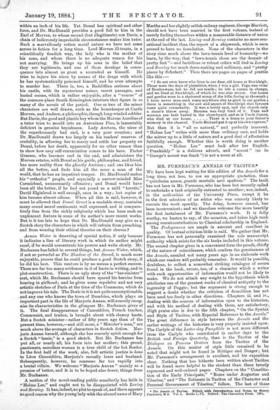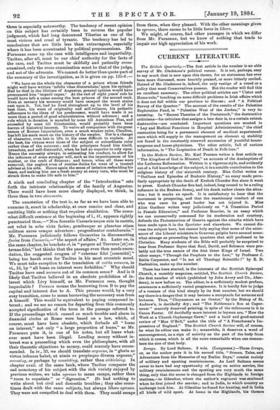MR. FURNEALIX'S ANNALS OF TACITITS.*
WE have been kept waiting for this edition of the Annals for a long time, not less, to use an appropriate quotation, than " quindecim annos, grande mortalis aevi spatium." The fault has not been in Mr. Furneaux, who has been but recently called to undertake a task originally entrusted to another; nor, indeed,. in the authorities of the University Press, except it be in the first selection of an editor who was scarcely likely to execute the work speedily. The delay, however caused, has been inconvenient; and we therefore welcome the more heartily the first instalment of Mr. Ftumeaux's work. It is fully worthy, we hasten to say, of the occasion, and takes high rank among recent contributions to Classical scholarship in England.
The Prolegomena are ample in amount and excellent in quality. Of textual criticism little is said. We gather that Mr. Furneaux has not personally examined the sole manuscript authority which exists for the six books included in this volume. The second chapter gives in a convenient form the proofs, chiefly of the nature of coincidences, which confirm the genuineness of the Annals, assailed not many years ago in an elaborate work which our readers will probably remember. It would be possible, doubtless, to collect a somewhat striking catalogue of errors found in the book, errors, too, of a character which a writer with such opportunities of information would not be likely to make. We do not attach any weight to the hypothesis which attributes one of the greatest works of classical antiquity to the ingenuity of Poggio ; but the argument is strong enough to suggest a doubt whether the criticism of demolition has not been used too freely in other directions. Chapters iii. and iv., dealing with the sources of information open to the historian, and with his method of dealing with them, are satisfactory.. High praise also is due to the fifth chapter, "On the Syntax and Style of Tacitus, with Especial Reference to the Annals." The great difference in style between the Annals and the earlier writings of the historian is very properly insisted upon. The Carlyle of the Latter-day Pamphlets is not more different from the Carlyle who contributed in earlier days to the British and Foreign Quarterly, than is the Tacitas of the Dialogue on Famous Orators from the Tacitas of the Annals. On this matter of style little remained to be noted that might not be found in Bottiger and Drager ; but Mr. Furneaux's arrangement is excellent, and his exposition clear. Nothing that has hitherto been written about Tacitus will be found more helpful to the student than these tersely expressed and well-ordered pages. Chapters on the "Constitu- tion of the Early Priucipate," "Rome under Augustus and Tiberius," and "The Estimate in Tacitus of the Character and Personal Government of Tiberius," follow. The last of these • The Almelo of Taman. Edited, with Introduction and Nolo, by Henry Furneanx, Id A. Vol. I. Books I..3/1, Oxford : The Clarendon Press. lest.
three is especially noteworthy. The tendency of recent opinion on this subject has certainly been to reverse the popular judgment, which had long denounced Tiberius as one of the most vicious and cruel of tyrants. The tendency has led to conclusions that are little less than extravagant, especially where it has been accentuated by political prepossessions. Mr. Furneaux sums up the case with intelligence and impartiality. Tacitus, after all, must be our chief authority for the facts of the case, and Tacitus must be skilfully and patiently cross- 'examined, only the cross-examination must be that of the judge, and not of the advocate. We cannot do better than quote part of the summary of the investigation, as it is given on pp. 135-6 :—
"We have on the whole the character of a prince whose friends might well have written infelix vitae diuturnitate,' upon his epitaph. Had he died in the lifetime of Augustus, general opinion would have pronounced him imperil capax.' At the end of eight years' rule he would have left a name among the best princes of the second rank. Even at seventy his memory would have escaped the worst stains cast upon it. Yet, had he lived throughout up to the level of his best time, his want of originality and self-reliance, his pedantic adherence to the ideas of his predecessor, would have made it no more than a period of good administration without advance ; and a rule which in duration is equalled by none till Antoninns Pins, and exceeded by none till Constantine, would probably have been barren of historical interest. To waive all comparison with the great names of Roman Imperialism, even a much weaker ruler, Claudius, has left his mark more on the history of the empire. Nor is a change of character, even late in life, in his case difficult to explain. At the best', his virtues were those of the subject or subordinate ruler rather than of the autocrat ; and the principate found him timid, irresolute, and self-distrustful, when he had no superior to rely upon. Hence the necessity always, in estimating his conduct, to allow for the influence of some stronger will, such as the imperiousness of his mother, or the craft of Seianus ; and hence, when all these were removed, the neglect even of routine duties for want of a trusted adviser at his side. Hence again the sense of isolation redoubling his fears, and making him see a fresh enemy at every turn, who must be struck down to make life safe to him."
A ninth and concluding chapter of the " Introduction " sets forth the intricate relationships of the family of Augustus. These would have been more clearly displayed, we think, in three than in two stemmata.
The annotation of the text is, as far as we have been able to examine it, exact in scholarship, at once concise and clear, and omitting little or nothing that requires elucidation. The some- what difficult sentence at the beginning of i., 41, appears rightly punctuated thus,—" Non florentis Caesaris neque suis in castris, set velut in urbe victa facies ; gemitusque ac planctus etiam militum anres oraque advertere : progrediantur contuberniis." Mr. Furneaux judiciously follows Gronovius in disconnecting facies from Caesaris,—" the aspect of affairs," ctc. Later on, in the same chapter, he brackets et, in " pergere ad Treveros [et] ex- ternae fidei," but thinks that the passage even then needs emen- dation, the suggested zeugma of " externae fidei [committi]" being too harsh even for Tacitus in his most eccentric mood. We must take exception to the translation of vetita versura, in vi., 16, by "all loans on interest were forbidden." Why should Tacitus have used versura out of its common sense P And is it likely that Tacitus believed in an absolute prohibition of in- terest which Livy himself, as Mr. Furneaux sees, thought improbable ? Versura means the borrowing from B to pay the capital and interest due to A. This process would, by a very easy transition, come to mean borrowing the necessary sum from A himself. This would be equivalent to paying compound in- terest ; and we see no reason for departing from this commonly accepted signification of the term in the passage referred to. If the proceedings which caused so much trouble and alarm in _financial circles at Rome were based on a law, which, of course, must have been obsolete, which forbade all "loans on interest," not only "a large proportion of loans," as Mr. Furneaux puts it, in one of his notes, but all loans what- ever must have been illegal. Lending money without in- terest was a proceeding which even the philosophers, with all their theoretic objections to money, could scarcely have recom- mended. In iv., 33, we should translate arguens, in " gloria ac virtue infensos habet, ut nimis ex propinquo diversa arguens," accusing, or perhaps by convicting, rather than criticising. In chapter xxxii. of the same book, where Tacitus compares the sad monotony of his subject with the rich variety enjoyed by previous writers, we take egressu to mean escape, rather than "room to expatiate" or "digression." He had nothing to write about but civil and domestic troubles ; they also some- times dealt with the same subjects, but always libero egressu. They were not compelled to deal with them. They could escape from them, when they pleased. With the other meanings given to egressu, there seems to be little force in libero.
We might, of course, find other passages in which we differ from Mr. Furneaux, but we know of nothing that tends to impair our high appreciation of his work.



































 Previous page
Previous page